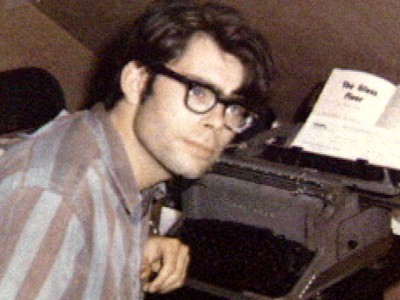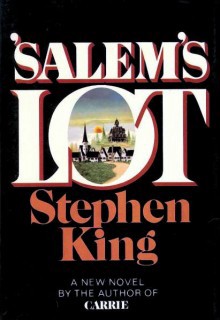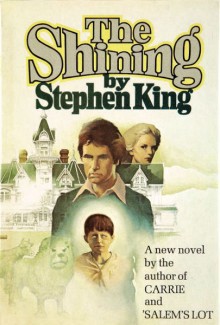Becoming Stephen King
Becoming Stephen King
by Michelle Dean

“Critics are men who watch a battle from a high place then come down and shoot the survivors,” Ernest Hemingway once wrote, with typical pugnacity. But are the critics sometimes right? In this occasional series we’ll examine the early careers of now-beloved authors to see what the critics first made of them.
Carrie, the high-school revenge fantasy that launched a thousand tampons, started out in Stephen King’s mind as a short story. He intended to place it, according to his memoir On Writing, with the magazine Cavalier. (Cavalier was a Playboy/GQ precursor that is still published today in a slightly less exalted form.) He’d been writing a lot for them; it was the chief way the Maine schoolteacher could make any money. His salary was just $6,400 a year, a little under $30,000 in today’s terms. Cavalier’s intermittent checks had bought the family things like amoxicillin for his young daughter’s ear infections.
Blessings like those had convinced King that the only thing worth writing, at the moment, was short stories. They paid. So when Carrie began to flourish, extending long past Cavalier’s 3000-word limit, he threw it away. The length wasn’t the only thing about it that troubled him; he also felt he didn’t know enough about girls to write it. His wife Tabitha pulled it from the trash, and insisted he continue it. She promised to fill him in on the ways of young women. And within three months he had a seventy-thousand-word novel.
Doubleday bought it for $2,500, the equivalent of just under $14,000 today. People in the publishing world loved the novel, and by the time Doubleday was looking to sell paperback rights the price was at $400,000, of which $200,000 went directly into the pockets of the agent-less Mr. King. For those keeping track, that means King cleared what is about a million today on the paperback of his very first novel.

When the novel was published in hardcover in 1974, it wasn’t reviewed by any of the major publications, though it got a tiny plaudit in the New York Times from someone writing the mystery column, one with the engaging title of “Newgate Callendar,” who observed, “That this is a first novel is amazing. King writes with the kind of surety only associated with veteran writers.” “Hard to believe,” sniffed a less-impressed reviewer at the Chicago Tribune, “but almost as hard to put down.”
But for all the money and relatively good reviews, Carrie sold only 13,000 copies in hardcover, which back then wasn’t impressive enough to put it on the New York Times bestseller list. It took Brian De Palma buying the rights, and the release of the paperback in 1975, for it to sell a million copies. It was only then that the Stephen King that you and I know, and grew up with, was on his way.
It just goes to show you: it’s not just luck you need to have a successful literary career. It’s luck, piled on luck, piled on luck again, and around the corner, you need another sprinkling of it. That’s just the way the Fates roll.
There are, of course, those who wish that Jesus had taken the wheel from the Fates when they anointed King the Biggest Thing in Books People Actually Read For the Last Thirty Years Or So. Recently, apropos of very little, the LA Review of Books published an essay by someone named Dwight Allen entitled “My Stephen King Problem.” I’d summarize it for you but I doubt I need to. King is the kind of writer about whom everyone has some grand sweeping opinion, and the negative ones are all the same: He’s a hack, here is a terrible sentence, there is a cliché, a stock character. The peons all read the man and they do not want from literature what I want from literature, which is enrichment and philosophy and definitely more than a few references you’d have to pay college tuition to understand. You know the routine, everyone’s danced it a few times.
We have this argument about a lot of writers. Particularly the rich ones. Particularly the ones who get rich off the first novel. And much of the time those authors’ egos are so inflated that they deserve it. Thinking of yourself as the Second Coming of Literature is an unflattering figure to cut, and a lot of people mistake money — or its fickle brother-in-law, media attention — for real, heartfelt praise. People like Vidal, and Mailer, and, well, Bret Easton Ellis: chest-beating appears to be the way they ward off the inevitability of Death. (At least two of them have been proved wrong.)

But then King was never like that. When Salem’s Lot, his second novel, was published, bestseller status was a preordained thing. The reviews were sparse, but slightly more sanguine this time — a Chicago Tribune writer complained the book was “a bit long,” presaging the self-diagnosis of “diarrhea of the typewriter” King would offer in later years. But in September 1976, it would hit the number-one spot on the paperback list. And to celebrate the occasion, King wrote something for the New York Times Book Review. He wrote an essay about someone else’s novel.
The novel in question — David Madden’s Bijou — was a smaller, more literary release. It was a bildungsroman about a young man who worked as an usher in a movie theater. King said it was “one of the books I admire most in the world.” He compared it to his own book, finding Salem’s Lot too easy, too accessible: “Bijou is a cooler ocean, and the footing underneath shelves off much more suddenly.” And, King noted, it had taken Madden six years to write it. In exchange for that sweat of brow, Madden had earned a $15,000 advance, about $2,500 a year. In exchange for the eight months King spent writing Salem’s Lot, he stood to make about half a million.
From there King’s piece devolves into a half-hearted defense of his style, which he refers to as the “Plain Style,” rounding up Robertson Davies, Milton, Joyce Carol Oates in an unlikely army for the defense of “honest books.” Like so much of King this argument is a bit rambly, a bit kitchen-sink, if pleasantly so. And at the end all he offers to the aspiring writer is the potential to do your honest best:
The object in view is to not let the money sway you from that, or the critics, or the wrath of god. Honest intent has nothing to do with art, one way or the other; art is its own master and talent is merely its whore.
His upshot is that the only thing you can do honestly is “sit down in front of the typewriter and do the best job you can.” That is the kind of plainspoken advice that can both comfort and drive critics crazy. Because there are a lot of people out there earnestly writing their opuses on nights and weekends, in the margins of bad jobs and marriages. But the doggedness isn’t enough to rescue the work.

That theme — that it isn’t enough to be honest — played out when The Shining, published in 1977, finally put King in the sightlines of the literary critics. King has often said that the book is somewhat autobiographical, at least as regarded his less-than-ideal (not to mention alcoholic) state of mind, though he said he didn’t quite know it as he was writing.
In any event, critics did not feel he had done the best job he could. Richard Lingeman, in the Times, deemed King “a writer of fairly engaging and preposterous claptrap,” whose chief talents were his imagination and his ability to gauge the market for his sort of work, chiefly the young and impliedly credulous. Another reviewer, Jack Sullivan, found the clichés too much to bear, and hated the way King had of apologizing for them right in the text. (In King’s defense: Getting to use this tactic is one benefit of making your protagonist a writer, like Jack Torrance is, one supposes.) The scares the book offered were not enough for Sullivan; though he did find a few scary, “the hyperbole and stylistic fumblings make an equal number unintentionally funny.”
A freelance reviewer for the Chicago Tribune was something of an exception. He liked The Shining well enough, though he spent over half his review in an abstract riff on the frightening ways of children, which suggests he may have missed the boat on The Shining’s actual villain. But he also took the opportunity to backswipe at King’s prior achievements: “Carrie is badly written… for all its far-out scenes [it] is merely appalling and somewhat numbing in effect.”
I happen to disagree with this critic, but I’m at pains to articulate why. Like many of King’s fans, I read him as a lonely teenager. I was like a kitten clinging to a magic carpet. But once, when I was extolling the virtues of It to a friend in high school, he asked, “But what is the ritual of CHUD?” And I realized I could not really answer, beyond the sort of icky juvenile sex thing, and in that moment grew up, a little. My honest reading was suddenly not enough.
That said, at least once a year, usually in that time where things are most underwater, I re-read my favorite book of his, The Stand, first published all the way back in 1978. I am apparently not alone in being the kind of person who’d declare it the best thing King ever wrote. “There are people out there who would have been perfectly happy had I died in 1978,” King told the Paris Review a few years back. “I usually tell them how depressing it is to hear them say that something you wrote twenty-eight years ago was your best book.” The only thing he’s asking for, I guess, is that you extend him the same sort of kindness he has always been so quick to offer others.
Previously: Becoming Joan Didion
Michelle Dean writes in a lot of places, now. Follow her on Twitter.
